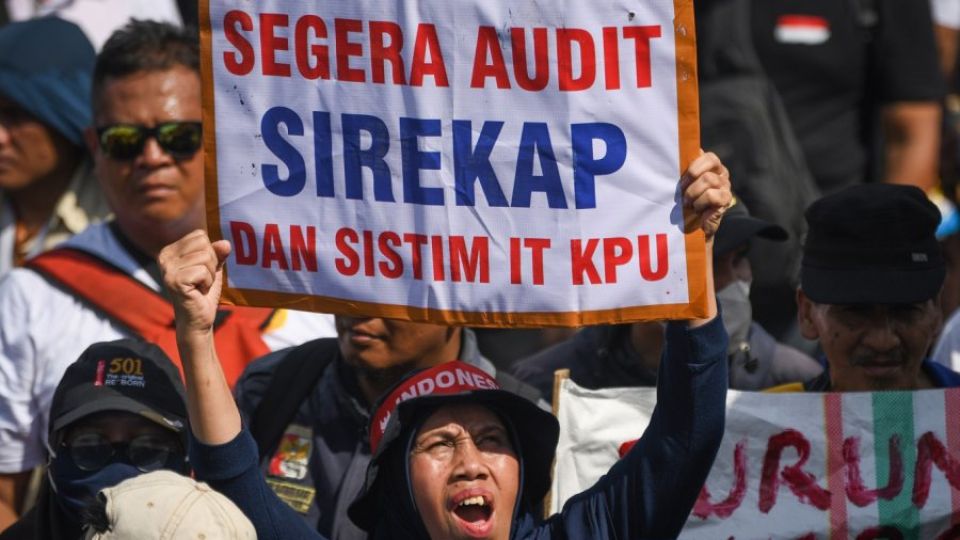March 4, 2024
JAKARTA – A barrage of complaints over apparent data breaches in the 2024 voter roll and inaccuracies in a new tabulation platform has cast further doubt on the integrity of the already troubled General Elections Commission (KPU) and its ability to reliably determine the results of the 2024 election.
Shortly after the start of the national vote tabulation process on Wednesday, KPU chairman Hasyim Asy’ari suspended the proceedings for several hours as all seven of the election body’s commissioners were obligated to attend an ethics hearing held by the Election Organization Ethics Council (DKPP) regarding an investigation into alleged voter roll data leaks.
The allegations emerged in November 2023 after an online account called Jimbo posted on the online hacker platform BreachForums that they were looking to sell 204.8 million pieces of unique data from Indonesia’s voter list.
To prove the authenticity of the data, the account shared 500,000 data points, consisting of voters’ full names, genders, places and dates of birth and ID and family card numbers.
A person identified as Rico Nufiansyah Ali filed a complaint with the DKPP over the alleged breach, demanding that all seven KPU commissioners be fired for what he said was unaccountable and unprofessional behavior that led to the data leak.
Read also: Voter roll breach claim overshadows election logistics preparations
At the Wednesday hearing, the KPU commissioners called the accusations leveled against them “groundless” and insisted that the commission had taken appropriate steps to protect voter roll data “in a professional and accountable manner”.
The KPU also insisted that it was working closely with law enforcement, including the National Cyber and Encryption Agency (BSSN) and the National Police’s cybercrime unit, to investigate the alleged breach.
“There is sufficient reason for the DKPP panel to reject all of the complainant’s arguments and rehabilitate the [KPU’s] good name,” KPU commissioner Betty Epsilon Idroos said.
The hearing on Wednesday was adjourned indefinitely, with the council expecting to hear more testimony from experts and other related parties at some point in the future.
Glitchy tech
The data leak is not the only electoral controversy the KPU is facing.
The election body has faced criticism over apparent discrepancies in the Tabulation Information System (Sirekap), the KPU’s new digital vote-counting platform. The application was offered as a way for the public to monitor the tabulation process by comparing the manual tallies at polling stations with those recorded on the digital platform.
Poll administrators at the polling stations took pictures of the manual C1 vote-tally forms and uploaded them to Sirekap, which then converted the figures into digital data using character recognition.
The official election results will, however, still be determined by manual tiered vote counting, which is expected to finish by March 20.
Read also: KPU insists on using Sirekap
But Sirekap has drawn complaints from social media users and political parties for its apparent failure to reliably read vote tallies from the photographed official forms.
The camps of presidential candidates Anies Baswedan and Ganjar Pranowo also claim to have found inflated vote numbers for rival Prabowo Subianto, whom registered pollsters expect to have won the election.
Too lenient?
Some election observers say the issues indicate the KPU’s unprofessionalism and could undermine faith in the election results.
“The KPU looks unserious in handling the technology used in the elections and continues to underestimate the arising problems. This clearly shows a lack of commitment to work professionally and ethically,” Ihsan Maulana, researcher at elections watchdog Perludem, told The Jakarta Post.
KPU chair Hasyim and other commissioners had been found in violation of the commission’s code of ethics on multiple occasions ahead of this year’s general election.
In one ruling, the DKPP found all KPU commissioners guilty of ethics breaches for allowing Gibran Rakabuming Raka, the eldest son of President Joko “Jokowi” Widodo, to register his vice presidential candidacy before the commission had adjusted its candidacy requirements through an internal regulation.
Gibran announced he would be Prabowo’s running mate after the Constitutional Court, led at the time by Jokowi’s brother-in-law Anwar Usman, made last-minute changes to candidate age requirements that enabled him to run.
Read also: KPU found guilty of ethics breach in handling of Gibran VP bid
If such shortcomings continued, Ihsan said, it could spell trouble for future elections, setting a bad precedent for future officials and eroding public trust in election results.
The complaints against the KPU that the DKPP was currently hearing might not be the last, he added.
He criticized the DKPP for giving Hasyim and the other commissioners only “strong reprimands” despite finding them guilty of ethical violations in at least four cases.
“The DKPP needs to take stronger actions by imposing tougher sanctions against the KPU to create a deterrent effect,” Ihsan said.


